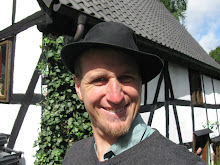Well, I've been in Britain for almost two months now, and I notice my only post has been about New Zealand! Homesick? Perhaps a little. I'm still travelling though, for a good while yet.
I have had several experiences I have felt were almost deserving of a blog entry. They include: escorting a bleeding drunk youth home in Newcastle; Ceidlhs and Scottish folk music nights in Newcastle and Glasgow; visiting my great-grandparents' graves; looking for stray golf balls at Gourock Golf Club with two adolescents who claimed they were drug-dealers; packing gourmet smoked goods into hampers 14 hours a day in Oban; learning to understand the words 'hame' 'hoose' and 'fer'. My funniest story would be getting very excited seeing a magazine in a Glasgow newsagents, coloured green, titled 'The Alternative View'. Great! some counter-cultural reading! I fish for a pound in my pocket. On closer inspection the subtitle was
'the magazine for Celtic supporters that deals with the real issues'.
Of course it was about fitba', not ecology. But what kind of place has multiple magazines about a single football club?

But I can't keep writing this blog while I'm here. There are many reasons. Sadly, perhaps unavoidably, I don't feel the wide-eyed wonder that I have had all through my trip, including the first time I was here. I think wonder is vital to good travel writing. Practically, I want to save money here, which can lead to both fatigue and monotony. To boot, a lot of the rest of my time is spent interacting with my family, and you don't want to know what we get up to!
In any case, many of you are already very Britian-savvy. You know that it is becoming more multicultural by the minute (The manuals in my last job are now written in Polish and English, for example) You know that 'security measures' both state and non-state, are ubiquitous (closed circuit television is everywhere). You know that West Scotland is wild and beautiful and England is crowded.

I do encounter things that inspire me personally, that you will be interested in, but they will be expressed in other ways than this site.
I would like to say 'Ta very much!' to everyone who has skimmed, read or devoured my tangential ramblings, and especially to those who commented, or wanted to comment but couldn't manage Blogspot's sometimes labyrinthine interface.
Hopefully this blog will rise again on phoenix wings, when I leave the UK. When will that be? Next summer, probably. Where will I go?

Across country to Southeast Asia via more of Europe (Mycenae! Amsterdam! Stockholm!), Siberia, China and Japan.
Peace.












































